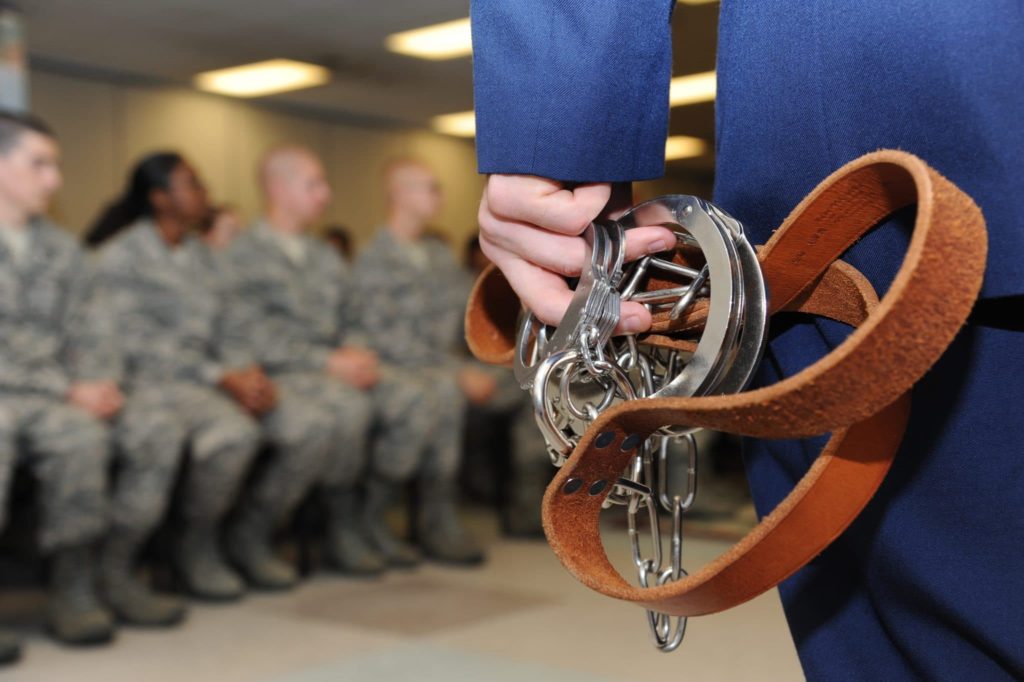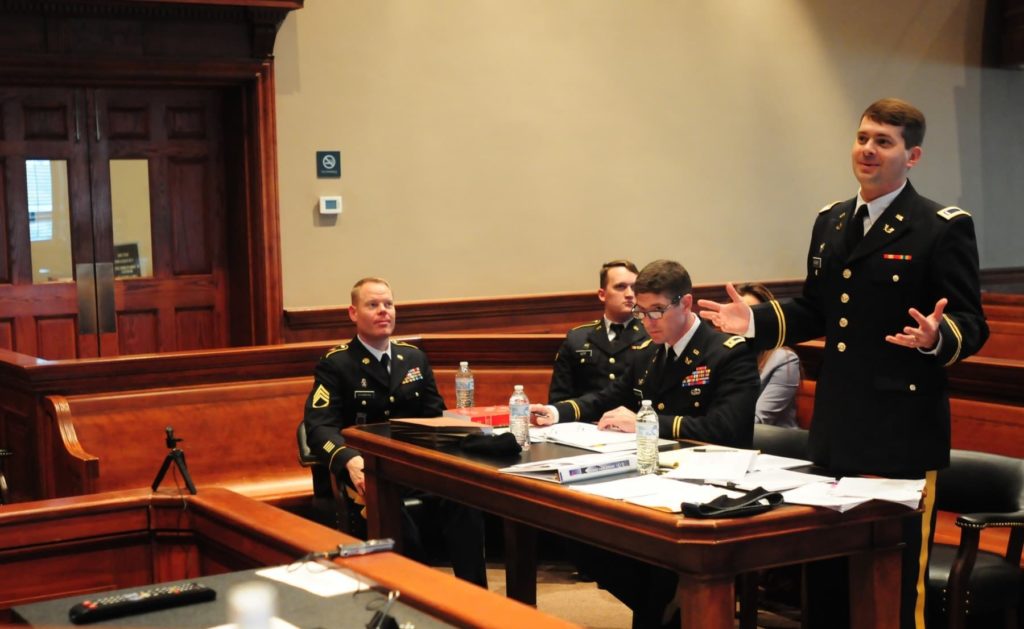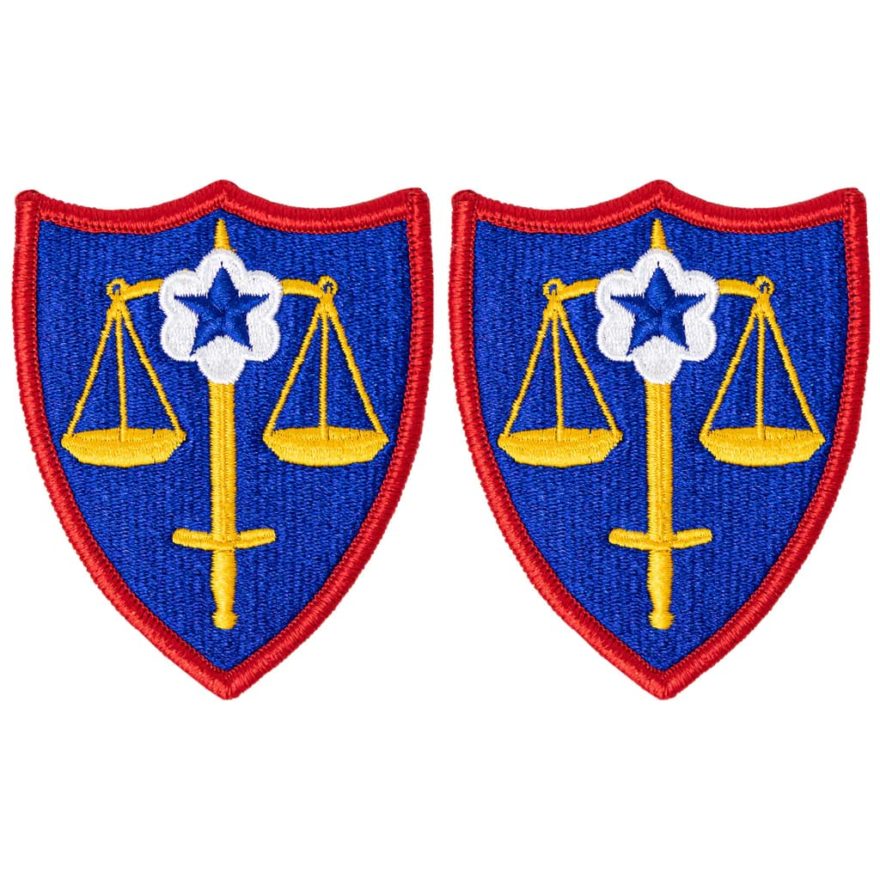Trial Defense Service TDS provides specified defense counsel services at no cost to Army personnel whenever required by law or regulation and authorized by the U.S. Judge Advocate General (TJAG).
Defense counsel represents Soldiers at court-martials, administrative reduction and separation boards, and physical eligibility boards. They also consult with Soldiers facing nonjudicial punishment or adverse administrative actions.
The Trial Defense Service (TDS) is a unit of the Army Judge Advocate General’s Corps responsible for providing conflict-free legal representation to soldiers facing adverse criminal and administrative actions. The mission of TDS is to protect and promote Soldiers’ statutory and constitutional rights, thereby ensuring the military justice system is fair and just.
TDS attorneys and paralegals are based in nine geographic regions throughout the Army: Atlantic, Southeast, Mississippi Valley, Great Plains, Southwest, Pacific Rim, Europe, and Asia. These offices are comprised of Army attorneys and paralegals who are commissioned as officers or enlisted personnel, graduated from an accredited law school, licensed to practice law in the U.S., and rated by their superiors within TDS.
A TDS attorney’s primary responsibilities are to provide criminal representation at trials by court-martial and Article 15 proceedings. This requires making motions, voir dire the panel, offering evidence, examining witnesses and cross-examining prosecution witnesses, presenting an argument, and negotiating on behalf of their clients.
Members of TDS also provide assistance to soldiers who are accused of an offense or have been selected as a suspect in an investigation by advising them of their rights and responding to letters of reprimand. Unlike in civilian courts, there is no means test to determine eligibility for TDS representation; all service members who are subject to the Uniform Code of Military Justice (UCMJ) are entitled to receive TDS representation at no cost.
What Does TDS do in the Army?

Trial Defense Service (TDS) provides conflict-free legal representation and counsel to Soldiers facing adverse criminal or administrative action at no cost to them. The trial attorneys and paralegals of TDS represent soldiers in a variety of matters, including Courts-Martial and other military disciplinary actions.
TDS has a number of offices throughout the United States. It is led by a Judge Advocate colonel who serves as the commander of the service.
There are nine geographic regions where TDS has field offices. They include the Atlantic, Southeast, Mississippi Valley, Great Plains, Southwest, Pacific Rim, Europe, and the West.
Each region has its own team of attorneys and paralegals based on the location of the office. TDS attorneys are independent of local commands and post-legal advisors, but they are supervised and rated by their superiors within the TDS.
In 1980, the Army established TDS as a separate command for its defense counsel to ensure objectivity and fairness. This two-year pilot program proved successful, and the command is now permanent.
TDS consists of military trial attorneys and civilian paralegals who are trained in a wide range of areas. They provide legal services to Soldiers and their families. They are also responsible for a range of programs, such as the Victim Witness Assistance Program and the TDS Training and Development Office. The TDS is headquartered in Fort Belvoir. They have attorneys and paralegals stationed in nine geographic regions.
What is the Definition of a Defense Service?

TDS is a legal assistance program that provides defense attorneys and paralegals to Soldiers facing adverse administrative proceedings. Members of TDS provide legal representation for disciplinary actions, investigations, and court-martial. They also advise Soldiers of their rights during adverse administrative separations, nonjudicial punishments, and summary courts-martial in which the basic facts of the case have been agreed upon prior to the trial.
The Trial Defense Service is an independent Field Operating Agency within the U.S. Army Judge Advocate General’s Corps and is headquartered at Fort Lee, Virginia. The active component of TDS has attorneys and paralegals stationed across nine geographic regions: Atlantic, Southeast, Mississippi Valley, Great Plains, Southwest, West, Pacific Rim, and Europe.
ITAR regulations place strict controls on the export of “defense articles” and “defense services.” A “defense article” is any item, software, or technical data specifically designed, developed, configured, adapted, or modified for a military, missile, satellite, or other controlled use listed on the United States Munitions List (USML).
ITAR defines “defense service” as the furnishing of assistance to foreign persons with respect to defense articles or the disclosure of technical data associated with a defense article. This includes training using non-public domain information with respect to the design, development, engineering, manufacture, production, assembly, testing, repair, or maintenance of a defense article. This also includes the integration of commercial parts or components into a defense article.
Trial Defense Services Fort Bragg
Located in North Carolina, Fort Bragg is home to one of the largest military installations in the world, with over 50,000 personnel. It is also home to some of the Army’s most prestigious units, including 82nd Airborne Division, 3rd Special Forces Group, and Delta Force.
Despite their high-profile status, Fort Bragg Soldiers can be accused of misconduct that can have a serious negative impact on their career and personal life. It is especially important for these soldiers to have an experienced Fort Bragg Military Lawyer in their corner to equal the playing field and help them fight for their rights at court-martial, Article 15, show cause board, letter of reprimand, or GOMOR hearings.
The Trial Defense Service (TDS) provides conflict-free legal services to soldiers facing adverse criminal or administrative actions at no cost to the soldier. Unlike public defenders in civilian jurisdictions, there is no means test to determine whether a soldier is eligible for TDS representation.
TDS attorneys represent Soldiers at all phases of the military justice process, including trials by court-martial and administrative separation boards, Article 15, show cause boards, letters of reprimand, and GOMOR hearings. They prepare motions, voir dire the panel, offer evidence, examine witnesses, present arguments, and negotiate on their client’s behalf.
The TDS consists of three reserve legal operations detachments (LODs). Each LOD oversees several Senior Defense Counsel who manage field offices that provide defense services for a specific post, command, or area. They are usually geographically separated from the TDS headquarters and are responsible for defense investigation in their areas of responsibility.
Trial Defense Services Fort Wainwright

The Trial Defense Service (TDS) is the name for a service that provides conflict-free legal representation to service members facing adverse criminal or administrative actions. TDS attorneys make motions, voir dire the panel, offer evidence, examine and cross-examine witnesses, present arguments, and negotiate on their client’s behalf.
The TDS headquarters is located in Arlington, Virginia. It is headed by a judge advocate colonel and consists of the Chief of TDS, the deputy chief, and a number of supporting attorneys and paralegals.
TDS is split into nine geographic regions, each of which oversees multiple senior defense counsels. Each region is responsible for providing defense services in a specific post, command, or area.
Aside from defense, the TDS also handles other gimmicks like legal administration and information technology. For instance, the TDS provides an online case management system to help soldiers keep track of their cases and documents and a virtual courtroom to provide video streaming for court-martial trials held at remote sites.
Currently, the active component of TDS has attorneys and paralegals stationed in nine geographic regions: Atlantic: Fort Drum, New York; Aberdeen Proving Ground, Maryland; Fort Belvoir, Virginia; United States Military Academy, Fort Lee, Virginia; Fort Meade, Maryland; Southeast: Fort Stewart, Georgia; Fort Bragg, North Carolina; Fort Jackson, South Carolina; and Hunter Army Airfield, Georgia.
The TDS is a separate command that was created between 1978 and 1980. Today, TDS is home to nearly 200 active-duty Army attorneys and dozens of military reserve lawyers. For a successful defense at an Army court-martial or other military hearing, it is imperative to have the assistance of an experienced UCMJ attorney.
Trial Defense Services Fort Hood
Located in Central Texas, Fort Hood is one of the biggest military installations in the world and is home to some of the Army’s most elite units. This includes the 4th Infantry Division (Mechanized), 1st Cavalry Division, 21st Cavalry Brigade, and 1st Army Division West, among others.
The base is also home to many Judge Advocate General’s Corp attorneys who are part of the Trial Defense Service. These attorneys are responsible for prosecuting and defending Soldiers accused of offenses under the Uniform Code of Military Justice.
Special Victim Counsels are trained to represent victims of sexual assault and can provide confidential legal assistance. These lawyers are specially trained to help victims understand and navigate the military justice system.
However, these professionals cannot always provide guidance and counsel beyond the courts-martial and boards that they are the mainstay of their work. This is why it is important to have a Fort Hood military defense attorney that has both experiences with criminal cases and court-martial trials to give you the best chance of successfully defending yourself.
In the aftermath of the tragic events in 2020 at Fort Hood, an Independent Review Committee was established to look into the command climate and culture there to ensure that it reflects the Army’s values of safety, respect, inclusiveness, diversity, and freedom from sexual harassment. The Fort Hood IRC’s 136-page Report offers findings and recommendations intended to benefit the Army and its soldiers, including efforts to promote the safety of service members.
